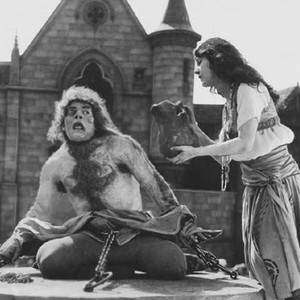This coming Sunday evening, one will be able to find Professor Andrew Hauze seated at the organ of the Swarthmore United Methodist Church in front of a gathering of community members there for the advertised “pre-Halloween fun.”
The event is a showing of the 1923 silent film The Hunchback of Notre Dame, with live accompaniment by Hauze, a conductor, pianist, and organist, who graduated from Swarthmore in 2004 and returned shortly thereafter to teach and perform at the college. Although a busy schedule on campus prevents him from focusing on much else, Hauze lives in the town of Swarthmore and says that he “love[s] to participate in musical events off-campus whenever there’s time,” often substituting as an organist at local churches and giving informal chamber concerts “with friends around town.”
In this case, he was asked to join the project by Linton Stables, who organized it on behalf of the Swarthmore Senior Citizens Association. Stables got the idea for a silent film showing with live accompaniment after attending one at Grace Cathedral in San Francisco, and, in the words of Hauze, “thought it would be a great way to have a town-gown community building event.” The evening is co-sponsored by seven local organizations, including the college’s Department of Music and Dance, and those involved are hopeful that this broad base of support will result in an equally broad range of people in attendance. They are aiming for a crowd of all ages that is well mixed between members of the college community and other Swarthmore area residents.
Professor Hauze was especially willing to participate due to his pre-existing interest in silent film music. In April 2017, he curated a collaborative performance between music faculty and students and Orchestra 2001, then Swarthmore’s official ensemble-in-residence, in which he conducted live the scores for Night Mail (1936) and The City (1939). Those works were composed by Benjamin Britten and Aaron Copland, respectively, but Hauze says that “many silent films didn’t have original scores” and that “instead, a local musician or even small ensemble would create a score from previously existing music, sometimes with new additions composed specifically for the movie.”
He found that in the case of The Hunchback of Notre Dame, any form of an original score has mostly been lost, and so instead decided to improvise, calling it “a lovely opportunity to try my hand at creating film music on the spot!” The final performance won’t be completely unstructured though, as Hauze explains that he has built upon “a number of French medieval folk songs and liturgical music [with] a relationship to the plot as themes for improvisation.” He has established a general framework that uses “the same themes in similar locations” in order to consistently match the cinematic mood, but lets the precise development and transitions between those set points be different each time he practices.
So, while some of the musical elements of Sunday’s show may be thrillingly spontaneous, there are a few sure details to remember: the event is on October 28th at 7:30pm in the Swarthmore United Methodist Church, at 129 Park Avenue. It is free and open to all, with free refreshments served at intermission, and promises to be a perfectly spooky way to start the whole holiday season.
Lydia Roe ’20
